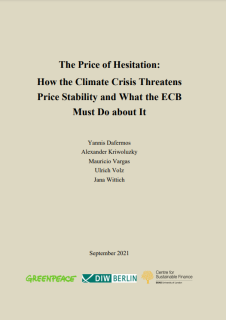
With an escalation of the climate crisis, the frequency and intensity of climate-related hazards will increase in the eurozone. If past data shows that natural events have already an impact on inflation, this effect can only become stronger as global warming increases, with important ramifications for European Central Bank (ECB) policies and operations. The ability of the ECB to control inflation may be significantly undermined if the world passes the 1.5 or 2 degrees threshold. Therefore, actions that prevent an increase in global warming have an important role to play in allowing the ECB to achieve its primary objective in the future.
This report presents for the first time empirical evidence of the impact of natural disasters on inflation in the eurozone, highlighting the challenges facing the ECB to achieve price stability in the era of the climate crisis. Results show that natural disasters lead to increases in headline and core inflation, with price increases being higher for food and beverages. The effects are small but significant. The report also show that there are significant differences between eurozone countries in the way that inflation is affected by natural disasters
